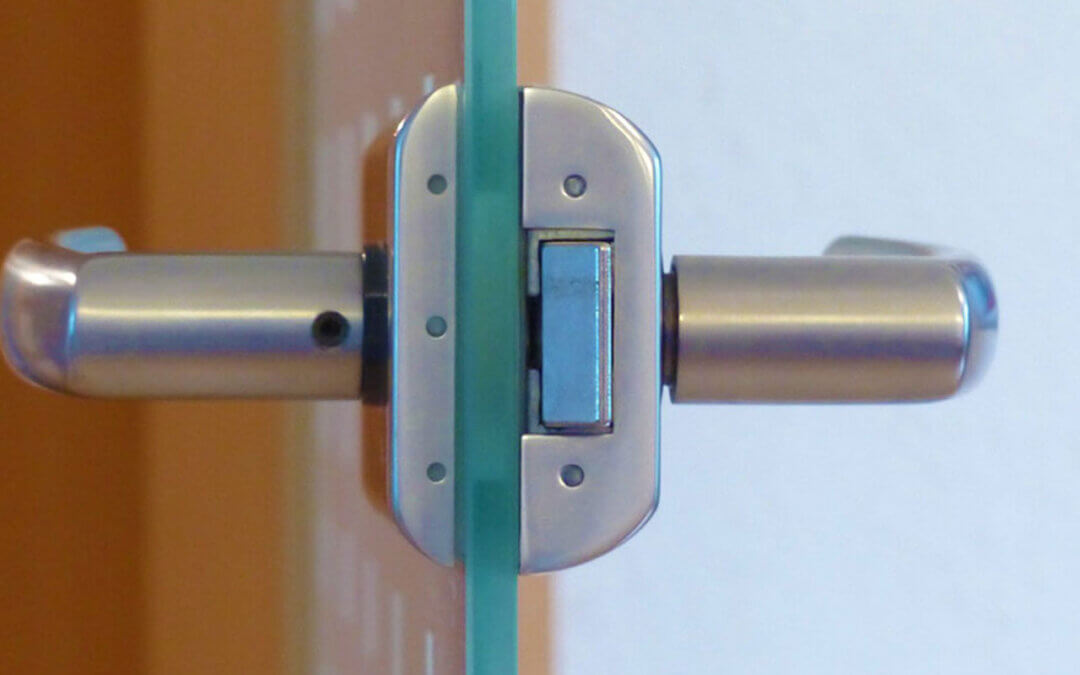As the name suggests, a mechanical door lock is the most basic type of locking mechanism. It uses a physical element to prevent unauthorized access to your home or business.
Mechanical locks are usually very cheap and easy to install, which makes them great for budget-conscious homeowners. However, they can be susceptible to tampering by burglars who know how they work.
For maximum security and peace of mind, you should consider upgrading your existing mechanical door lock with one that’s more advanced and secure such as an electric strike plate or smart deadbolt system. This will give you greater protection against potential intruders without breaking the bank in installation costs!
Here’s a breakdown of the 4 main categories mechanical door locks fall into:
1. Deadbolt Door Locks
This is the most common type of mechanical door lock and you can find it in most homes and businesses. A deadbolt works by sliding into a locked or unlocked position via a rotating cylinder that can be turned with either a key or a knob.
Deadbolts are considered to be very strong especially from forced entry because of how many locking points there are in comparison to other types of door locks for security doors. However, they can become faulty over time as parts wear out, which means they need to be replaced every 5-10 years depending on your use and maintenance of them. They also tend not to work properly during cold weather which makes them less reliable in the winter months.
Types of Deadbolts:
Standard Deadbolt – this is the basic variant of deadbolt door locks. It has a keyhole on both ends which allows it to be locked and unlocked by two separate keys.
Double Cylinder Deadbolt – this variant is the same as the standard type except that it can be locked or unlocked using either end of the key, which makes it easier for people living in condos who don’t want to go up and down stairs all day long just to get in and out of their homes. However, this also means you must keep track of 2 sets of keys.
Single Cylinder Deadbolt – similar to the double cylinder version except that instead of having 2 separate locking mechanisms (one at each end), they only have one (at the front). This makes it more difficult for burglars to break in because they can’t just smash the window and unlock the door from the inside.
2. Mortise Door Locks
This type of lock is mounted into the door itself and is much harder to pick or tamper with than a deadbolt. Mortise locks have a long history dating back to the 18th century and are still popular in high-end homes and businesses today.
They come in both keyed and keyless varieties, with the keyed version typically being more secure. However, mortise locks are also more expensive than deadbolts and require more maintenance as they tend to wear out faster.
Keyed Mortise Door Locks:
Key In Knob (KIK) – this type of mortise lock is activated by inserting a key into a knob on the door and turning it. It’s the most common type of keyed mortise lock and can be found in most homes and businesses.
Key In Lever (KIL) – this type of mortise lock is similar to the key in knob type, except that the key is inserted into a lever on the door instead of a knob. It’s less common than the key in the knob version but is becoming more popular because it’s easier to use for people with arthritis or other hand mobility issues.
Passage Mortise Lock – as the name suggests, this is a mortise lock that’s designed for use in passage doors (such as between a bedroom and bathroom) where locking the door is not necessary. It’s typically found in homes where there are children or elderly family members who need to be monitored.
Privacy Mortise Lock – this type of mortise lock is similar to the passage lock, except that it has a keyhole on the inside as well as the outside so that it can be locked from either side. It’s commonly used in bedrooms and bathrooms to provide privacy for the occupants.
Keyless Mortise Door Locks:
Electronic Keypad – this type of keyless mortise lock is activated by entering a passcode into a keypad on the door. It’s one of the most popular types of keyless mortise locks and is very secure because there’s no way to guess the passcode.
Touchpad – this type of keyless mortise lock is also activated by entering a passcode, but instead of using a keypad, it has a touch-sensitive pad that you swipe your finger across.
Fingerprint Reader – this type of keyless mortise lock is the most secure type because it uses biometric authentication (your fingerprint) to unlock the door. Only authorized users can unlock the door with their fingerprints, making it perfect for businesses or homes with sensitive information or valuables.
3. Cylindrical Door Locks
These types of locks are typically mounted on the side of the door and use a key (or lever) to rotate the cylinder.
Cylindrical locks provide limited protection against forced entry because they can usually be shaken loose very easily unless they’re installed in solid doors or jambs, but they’re still commonly used for residential and commercial applications thanks to their low price and ease of installation.
4. Spring Bolt Door Locks
This type of lock is mounted on the door itself and slides horizontally between a pair of brackets to prevent entry. Similar to mortise locks, they’re very secure but also more expensive than standard deadbolts.
Spring bolt door locks are a good option for people who want the security of a mortise lock but don’t want to pay the higher price. They’re also much easier to install than mortise locks, making them a good choice for people who aren’t comfortable doing home repairs.
What are the advantages and disadvantages of mechanical locks?
You are able to just quickly open the door with a simple turn of the handle. It does not require you to have any knowledge of codes or keys to actually get in, which is great for houses that have children who tend to lose their keys often. This type of lock is also known for being very low maintenance, which is great news if you are using it on something that sees frequent use.
They can be easy to pick if you do not know what you’re doing (and they come in many different styles), making it easy to break into if you have the right tools. If someone knows how they work, they can also be picked or even broken off of the door.
It is difficult to install these types of locks on doors because you will need to create new holes to accommodate them, which depending on your door material may not be that easy; you then need to make sure that whatever surface you are putting it on is strong enough for this type of locking mechanism.
Are you looking for a new door lock?
With so many different door hardware options available today, it may seem like there’s no way to keep yourself protected against potential intruders. However, when you consider the different purposes behind each type of lock – and the pros and cons of each type – you can choose a door lock that will effectively protect your home or business, while still providing an easy way for you to access it without putting too much stress on your body.
That’s why working with a professional locksmith from Locksmith King Rockville MD is so important! They have the knowledge and expertise required to install all types of mechanical door locks in residential homes and commercial buildings alike – so whether you’re looking for reliable security solutions, want help designing custom doors, or are just interested in learning more about how locks work, they can help out!




קמגרה למכירה בהרצליה אנשים באים אליה מהצפון, מהמרכז ומהדרום. לא לחינם נחשבת הרצליה לאחת מהערים המובילות בישראל בתחום הפנאי והבילויים. הרצליה היא עיר תוססת, עם מפגשים אנושיים רבים, metamask token factory example
Best Dating Sites for Real Relationships in 2022 click here
❤️ You have unread messages from Susan (2)! Click Here: http://bit.do/fSTHz ❤️
❤️ Biswap & LaunchZone Winter Event | Share $5 000! Click Here: https://telegra.ph/Biswap–LaunchZone-Winter-Event–Share-5-000-12-28 ❤️
כל הכתוב באתר הינו מידע כללי בלבד. הכתוב באתר אינו מהווה יעוץ רפואי או המלצה לרכישה או שימוש בטיפול או מוצר כל שהוא המופיע באתר. נערות ליווי בהוד השרון
כל הכתוב באתר הינו מידע כללי בלבד. הכתוב באתר אינו מהווה יעוץ רפואי או המלצה לרכישה או שימוש בטיפול או מוצר כל שהוא המופיע באתר. נערות ליווי בחיפה
a Maria – Dance, Maria [Official Music Video]! Click Here: https://youtu.be/E5DYlF6_x2U
Make Money Online OVER $1,200 PER DAY with bitcoin UP! Do you know you can earn great profits by trading Bitcoin?